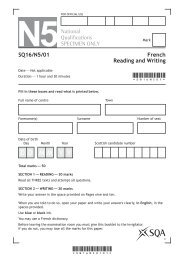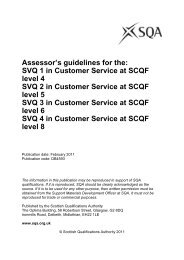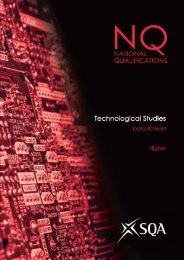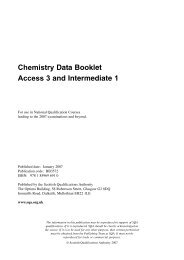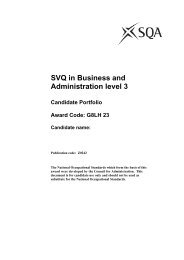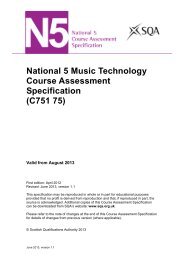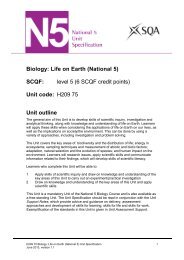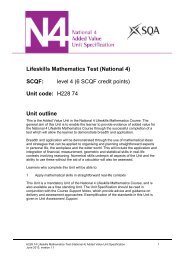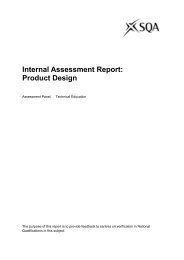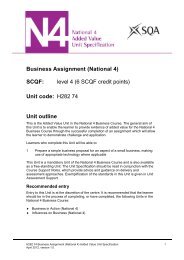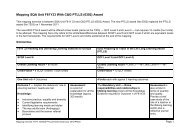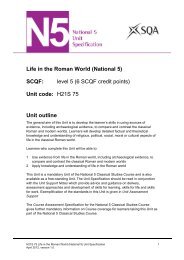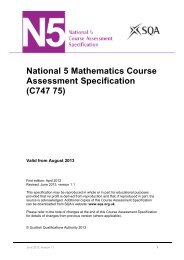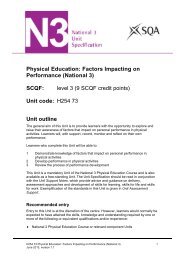Self in Community: Leisure Time Activities (SCQF level 2 ... - SQA
Self in Community: Leisure Time Activities (SCQF level 2 ... - SQA
Self in Community: Leisure Time Activities (SCQF level 2 ... - SQA
You also want an ePaper? Increase the reach of your titles
YUMPU automatically turns print PDFs into web optimized ePapers that Google loves.
<strong>Self</strong> <strong>in</strong> <strong>Community</strong>: <strong>Leisure</strong> <strong>Time</strong> <strong>Activities</strong><br />
(<strong>SCQF</strong> <strong>level</strong> 2)<br />
<strong>SCQF</strong>:<br />
<strong>level</strong> 2 (6 <strong>SCQF</strong> credit po<strong>in</strong>ts)<br />
Unit code: H1GN 42<br />
Unit outl<strong>in</strong>e<br />
The general aim of this Unit is to provide opportunities for learners to develop their<br />
social and <strong>in</strong>terpersonal skills while participat<strong>in</strong>g <strong>in</strong> two leisure time activities.<br />
Learners who complete this Unit will be able to:<br />
1 Select two leisure time activities<br />
2 Participate <strong>in</strong> the two selected leisure time activities<br />
3 Review their participation <strong>in</strong> the two leisure time activities<br />
This Unit is an optional Unit of the Personal Development Award at <strong>SCQF</strong> <strong>level</strong> 2 and<br />
is also available as a free-stand<strong>in</strong>g Unit. The Unit Specification should be read <strong>in</strong><br />
conjunction with the Unit Support Notes, which provides advice and guidance on<br />
delivery, assessment approaches, and development of skills for learn<strong>in</strong>g, skills for life,<br />
and skills for work. Exemplification of the standards <strong>in</strong> this Unit is given <strong>in</strong> the National<br />
Assessment Resource.<br />
Recommended entry<br />
Entry to this Unit is at the discretion of the centre.<br />
In terms of prior learn<strong>in</strong>g and experience, relevant experiences and outcomes may<br />
provide an appropriate basis for do<strong>in</strong>g this Unit.<br />
<strong>Self</strong> <strong>in</strong> <strong>Community</strong>: <strong>Leisure</strong> <strong>Time</strong> <strong>Activities</strong> (<strong>SCQF</strong> <strong>level</strong> 2) Unit Specification 1<br />
July 2013, version 1.1
Core Skills<br />
Achievement of this unit gives automatic certification of the follow<strong>in</strong>g:<br />
Complete Core Skills for the Unit - Work<strong>in</strong>g with Others at <strong>SCQF</strong> <strong>level</strong> 2<br />
Equality and <strong>in</strong>clusion<br />
This Unit specification has been designed to ensure that there are no unnecessary<br />
barriers to learn<strong>in</strong>g or assessment. The <strong>in</strong>dividual needs of learners should be taken<br />
<strong>in</strong>to account when plann<strong>in</strong>g learn<strong>in</strong>g experiences, select<strong>in</strong>g assessment methods, or<br />
consider<strong>in</strong>g alternative evidence. For further <strong>in</strong>formation please refer to the Unit<br />
Support Notes.<br />
<strong>Self</strong> <strong>in</strong> <strong>Community</strong>: <strong>Leisure</strong> <strong>Time</strong> <strong>Activities</strong> (<strong>SCQF</strong> <strong>level</strong> 2) Unit Specification 2<br />
July 2013, version 1.1
Standards<br />
Outcomes and assessment standards<br />
Outcome 1<br />
The learner will:<br />
1 Select two leisure time activities by:<br />
1.1 identify<strong>in</strong>g a variety of leisure time activities<br />
1.2 select<strong>in</strong>g one familiar and one unfamiliar leisure time activity for learner’s own<br />
participation<br />
1.3 communicat<strong>in</strong>g <strong>in</strong>formation about the activities selected<br />
Outcome 2<br />
The learner will:<br />
2 Participate <strong>in</strong> the two selected leisure time activities by:<br />
2.1 agree<strong>in</strong>g their role <strong>in</strong> the two selected activities<br />
2.2 carry<strong>in</strong>g out their role <strong>in</strong> the two selected activities<br />
2.3 provid<strong>in</strong>g <strong>in</strong>formation to another person dur<strong>in</strong>g the selected activities<br />
2.4 seek<strong>in</strong>g <strong>in</strong>formation from another person dur<strong>in</strong>g the selected activities<br />
Outcome 3<br />
The learner will:<br />
3 Review their participation <strong>in</strong> the two leisure time activities by:<br />
3.1 stat<strong>in</strong>g their op<strong>in</strong>ion about each activity<br />
3.2 giv<strong>in</strong>g one reason to support each op<strong>in</strong>ion expressed<br />
3.3 identify<strong>in</strong>g a strength <strong>in</strong> carry<strong>in</strong>g out their role <strong>in</strong> each of the leisure time<br />
activities<br />
Evidence Requirements for the Unit<br />
Assessors should use their professional judgement, subject knowledge and<br />
experience, and understand<strong>in</strong>g of their learners, to determ<strong>in</strong>e the most appropriate<br />
ways to generate evidence and the conditions and contexts <strong>in</strong> which they are used.<br />
It is expected that learners will receive support to achieve the Outcomes of this Unit.<br />
For Outcome 1 the activity may be either a group activity or one which the learner will<br />
complete on his/her own. However, the activity must be <strong>in</strong> a sett<strong>in</strong>g where the learner will<br />
have the opportunity to <strong>in</strong>teract with others under the supervision of the teacher/lecturer.<br />
This <strong>in</strong>teraction could be with other learners, the teacher/lecturer, or another relevant<br />
person.<br />
<strong>Self</strong> <strong>in</strong> <strong>Community</strong>: <strong>Leisure</strong> <strong>Time</strong> <strong>Activities</strong> (<strong>SCQF</strong> <strong>level</strong> 2) Unit Specification 3<br />
July 2013, version 1.1
Evidence for Outcomes 1, 2, and 3<br />
Evidence for this Unit could <strong>in</strong>clude checklists, a template, short written responses,<br />
recorded oral responses, a poster, photographic evidence, video evidence, or their<br />
equivalent.<br />
Advice and guidance on possible approaches to assessment is provided <strong>in</strong> the Unit<br />
Support Notes.<br />
<strong>Self</strong> <strong>in</strong> <strong>Community</strong>: <strong>Leisure</strong> <strong>Time</strong> <strong>Activities</strong> (<strong>SCQF</strong> <strong>level</strong> 2) Unit Specification 4<br />
July 2013, version 1.1
Development of skills for learn<strong>in</strong>g, skills for life,<br />
and skills for work<br />
It is expected that learners will develop broad, generic skills through this Unit. The skills<br />
that learners will be expected to improve on and develop through the Unit are based on<br />
<strong>SQA</strong>’s Skills Framework: Skills for Learn<strong>in</strong>g, Skills for Life and Skills for Work and<br />
drawn from the ma<strong>in</strong> skills areas listed below. These must be built <strong>in</strong>to the Unit where<br />
there are appropriate opportunities.<br />
1 Literacy<br />
1.3 Listen<strong>in</strong>g and talk<strong>in</strong>g<br />
3 Health and wellbe<strong>in</strong>g<br />
3.5 Relationships<br />
4 Employability, enterprise, and citizenship<br />
4.3 Work<strong>in</strong>g with others<br />
Amplification of these is given <strong>in</strong> <strong>SQA</strong>’s Skills Framework: Skills for Learn<strong>in</strong>g, Skills for<br />
Life and Skills for Work. The <strong>level</strong> of these skills should be at the same <strong>SCQF</strong> <strong>level</strong> of<br />
the Unit and be consistent with the <strong>SCQF</strong> <strong>level</strong> descriptor. Further <strong>in</strong>formation on<br />
build<strong>in</strong>g <strong>in</strong> skills for learn<strong>in</strong>g, skills for life, and skills for work is given <strong>in</strong> the Unit<br />
Support Notes.<br />
Employability, enterprise and citizenship skills shown <strong>in</strong> this National Unit provide<br />
automatic certification of Core Skill: Work<strong>in</strong>g with Others at <strong>SCQF</strong> <strong>level</strong> 2.<br />
<strong>Self</strong> <strong>in</strong> <strong>Community</strong>: <strong>Leisure</strong> <strong>Time</strong> <strong>Activities</strong> (<strong>SCQF</strong> <strong>level</strong> 2) Unit Specification 5<br />
July 2013, version 1.1
Adm<strong>in</strong>istrative <strong>in</strong>formation<br />
Published: July 2013 (version 1.1)<br />
Superclass:<br />
HB<br />
History of changes to Unit Specification<br />
Version Description of change Authorised by Date<br />
1.1 Core Skill statement added Qualifications<br />
Development<br />
Manager<br />
July 2013<br />
© Scottish Qualifications Authority 2013<br />
This specification may be reproduced <strong>in</strong> whole or <strong>in</strong> part for educational purposes<br />
provided that no profit is derived from reproduction and that, if reproduced <strong>in</strong> part, the<br />
source is acknowledged. Additional copies of this Unit can be downloaded from <strong>SQA</strong>’s<br />
website at www.sqa.org.uk.<br />
Note: readers are advised to check <strong>SQA</strong>’s website: www.sqa.org.uk to ensure they are<br />
us<strong>in</strong>g the most up-to-date version of the Unit Specification.<br />
<strong>Self</strong> <strong>in</strong> <strong>Community</strong>: <strong>Leisure</strong> <strong>Time</strong> <strong>Activities</strong> (<strong>SCQF</strong> <strong>level</strong> 2) Unit Specification 6<br />
July 2013, version 1.1



